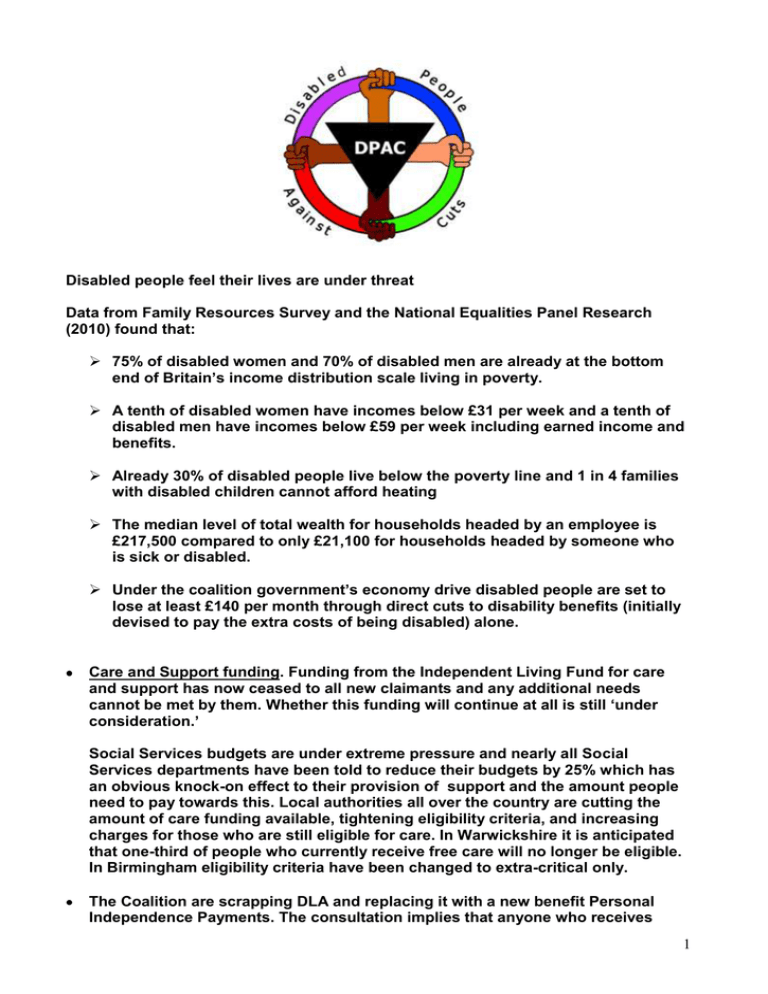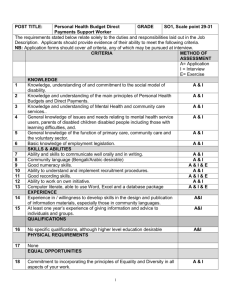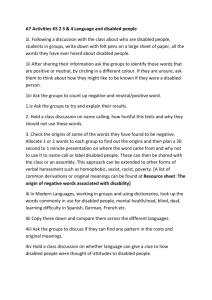Disabled people feel their lives are under threat
advertisement

Disabled people feel their lives are under threat Data from Family Resources Survey and the National Equalities Panel Research (2010) found that: 75% of disabled women and 70% of disabled men are already at the bottom end of Britain’s income distribution scale living in poverty. A tenth of disabled women have incomes below £31 per week and a tenth of disabled men have incomes below £59 per week including earned income and benefits. Already 30% of disabled people live below the poverty line and 1 in 4 families with disabled children cannot afford heating The median level of total wealth for households headed by an employee is £217,500 compared to only £21,100 for households headed by someone who is sick or disabled. Under the coalition government’s economy drive disabled people are set to lose at least £140 per month through direct cuts to disability benefits (initially devised to pay the extra costs of being disabled) alone. Care and Support funding. Funding from the Independent Living Fund for care and support has now ceased to all new claimants and any additional needs cannot be met by them. Whether this funding will continue at all is still ‘under consideration.’ Social Services budgets are under extreme pressure and nearly all Social Services departments have been told to reduce their budgets by 25% which has an obvious knock-on effect to their provision of support and the amount people need to pay towards this. Local authorities all over the country are cutting the amount of care funding available, tightening eligibility criteria, and increasing charges for those who are still eligible for care. In Warwickshire it is anticipated that one-third of people who currently receive free care will no longer be eligible. In Birmingham eligibility criteria have been changed to extra-critical only. The Coalition are scrapping DLA and replacing it with a new benefit Personal Independence Payments. The consultation implies that anyone who receives 1 support services from another source such as care funding from Social Services will not be eligible for the new benefit, Personal Independence Payment. However anyone who doesn’t qualify for support from other sources will also not be eligible for PIP. We have asked just which disabled people will be eligible for this. The mobility component of DLA is to be removed from disabled people living in residential care homes who do not pay for their own fees. This will result in a reduction in income of 66% for those disabled people, leaving them with £22 a week to pay for clothes, and for things like toothpaste, soap, outings, etc. Many disabled people use this mobility component to pay for wheelchairs, mobility scooters and travel to meet friends and family. Maria Miller, minister for disabled people says that care home MAY pay for residents to go to appointments such as at the doctor and dentist. Otherwise they will be effectively trapped in these homes. Other Benefits ESA and work capability assessments have been criticised by CAB, disability charities and Disabled People’s Organisations. Even people with terminal cancer have been declared fit for work and removed from Incapacity Benefit. The government have now said that from October 2010 they will speed up the re-assessment of everyone currently claiming Incapacity Benefit so that 10,000 claimants a week are ‘processed. Their overall aim in this is to remove an arbitrary 1 million disabled people from higher paying Incapacity Benefit onto lower paying JSA. These assessments which ignore GP and consultant views are earning Atos healthcare £100 million a year. At the same time as the government claim they want to help disabled people back into work they have slashed Access to Work funding which meets the costs to employers of any reasonable adjustments needed in a workplace. Yet only 15% of people with Autism and 35% of those with a mental health conditions are in employment. They are not workshy, but excluded by physical and attitudinal barriers. Housing Benefits for all tenants will be reduced. From October 2011 for those 2 million disabled people living in private rented accommodation and from 2013 for anyone living in social housing which is deemed too large for their needs From 2013 anyone unemployed for more than 12 months will have their Housing benefit reduced by 10% indefinitely. Given the additional difficulties disabled people face in getting and keeping employment this will impact even more on them. There are 1.8 million people households on social housing waiting lists. Currently 1 million children live in overcrowded households, changes to social housing tenure and housing benefits will only increase this. Already 30% of disabled people live below the poverty line and 1 in 4 families with disabled children cannot afford heating 2 The Chartered Institute of Housing has calculated that the cumulative effect of the coalition’s proposals mean that by 2020 every tenant’s Housing Benefit will be too low to cover their rent Benefits will be linked to the Consumer Price Index (CPI) instead of the Retail Price Index, so claimants will lose £300 a year as the CPI ignores any housing costs you might have VAT increased to 20% will hit those on the lowest incomes the hardest - it is estimated this rise will increase each household’s costs by £500 per year What disabled people say about these changes “At the moment I am able to claim £17.75 per week for care and £49.50 for mobility which goes straight to the Mobility Scheme and in total that comes to £269 a month. Now consider the fact I work four days a week and roughly pay £160 in tax. Without DLA I wouldn‟t be able to do my job, so I wouldn‟t pay tax. Without DLA I wouldn‟t be able to hire a Motability car which in turn means I wouldn‟t be paying tax on petrol. Without a car I would be less likely to travel to shops or be able to engage in leisure activities; things which impact, albeit in a small way, to the British economy. According to George Osborne the Government will introduce measures to assist disabled people „into the labour market‟, however, I have shown that the removal of DLA would not only take me out of the labour market, it would also halt the spending power I currently have. By going down this path, once at 2013 we could see disabled people like myself thrown onto the scrapheap and potentially becoming a greater drain on the Government‟s own financial resources. I don‟t need an Eton or Oxbridge education to know that this is a bankrupt political move which will do more harm than good to the economy, my life and family, as well as those of other disabled people.” ******************* “I am in receipt of DLA, without which I could not survive. I have severe allergies, home bound, mostly bedridden. I have carers, and have to pay for extra hours not subsidized by social services. My utility bills are extremely high, and I have to contribute to the rent, which is not met by housing benefits. I also suffer from malnutrition!! Being chronically ill is costly, being depending on carers for everything. Cutting DLA would mean, that I have to find housing within the Housing Allowance which is much much lower than rental market. There are pockets of housing, in undesirable areas, with mould and cockroaches, and no amenities, no lift, or if on the ground floor, simply not safe. I could go on and on, about the misery it would cause, to remove DLA. It would lead to a slow death painful death. Worth adding here, I have spoken to many in my situation, who are discussing mass suicide, rather than suffer more health miseries, for which there are no cures! They are not depressed, but pragmatic about what awaits all.” 3





